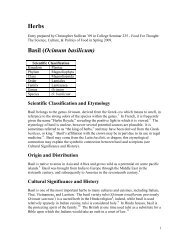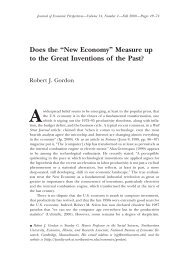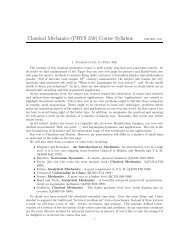Leek Scientific Classification and Etymology - Academics - Hamilton ...
Leek Scientific Classification and Etymology - Academics - Hamilton ...
Leek Scientific Classification and Etymology - Academics - Hamilton ...
You also want an ePaper? Increase the reach of your titles
YUMPU automatically turns print PDFs into web optimized ePapers that Google loves.
Garlic plants are susceptible to the same pathogens <strong>and</strong> pests discussed in the section on<br />
onions.<br />
Medicinal Role <strong>and</strong> Properties<br />
Ancient Times<br />
Garlic has long been known for its medicinal properties. The use of garlic in multiple<br />
forms was very prominent in ancient medicine as well as in modern homeopathic <strong>and</strong><br />
alternative remedies today. Garlic was a prominent remedy for many ailments ranging<br />
from the common cough <strong>and</strong> cold to stomach problems. 76 Dating back to the beginning of<br />
civilization, garlic has been documented as a remedy in China, India, Egypt, Greece <strong>and</strong><br />
Rome. Additionally, garlic was found in Egyptian tombs <strong>and</strong> Greek Temples. 77 Whether<br />
this means garlic had religious or ritualistic significance for these ancient cultures,<br />
however, remains unclear. Nutritionist Richard S. Rivlin notes that the presence of garlic<br />
in tombs “is strong evidence that the vegetable was in use” in these societies, yet<br />
acknowledges that “we do not know” whether garlic<br />
was employed in religious customs <strong>and</strong> rituals. 78<br />
For thous<strong>and</strong>s of years societies have used garlic in<br />
medicine for scores of different reasons. The<br />
Mesopotamians prescribed garlic for toothaches, painful<br />
urination <strong>and</strong> placed it inside amulets to prevent disease.<br />
Traditional Chinese medicine also linked garlic with the<br />
spleen, kidneys, <strong>and</strong> stomach. In ancient Greece the<br />
father of medicine, Hippocrates, used garlic frequently<br />
<strong>and</strong> included it into his arsenal of remedies. 79<br />
First-century testimonial by Dioscorides, an herbalist<br />
<strong>and</strong> a physician, <strong>and</strong> Pliny the Elder, an encyclopedist,<br />
dictated the next several centuries' beliefs concerning<br />
the medicinal powers of garlic. They believed that garlic<br />
expelled intestinal worms <strong>and</strong> skin parasites, protected<br />
against venomous animals, neutralized internal <strong>and</strong><br />
external inflammations, relieved toothaches<br />
<strong>and</strong> coughs, <strong>and</strong> reduced hemorrhoids. 80 In the<br />
Materia Medica, Dioscorides believed that garlic’s<br />
most important function was to remove excess fluid<br />
from the body by dilating blood vessels <strong>and</strong><br />
15 th century illustration of a garlic<br />
harvest from Tacuinum sanitatis, the<br />
Medieval h<strong>and</strong>book of wellness from<br />
Arab medicine (http://en.wikipedia.<br />
org/wiki/Image:Tacuinum_sanitatisgarlic.jpg).<br />
stimulating kidney function. 81 Together, Dioscorides <strong>and</strong> Pliny the Elder controlled the<br />
knowledge <strong>and</strong> therapeutic usage of garlic for centuries.<br />
<strong>Scientific</strong> Revolution <strong>and</strong> Beyond<br />
Later in the seventeenth century, Discorides <strong>and</strong> Pliny the Elder’s theories about garlic<br />
still held a high position in the field of medicine, but its ability to protect against diseases<br />
11






